Newt Gingrich: Trump Is Doing Exactly What He Said He Would Do
Morgan Walker
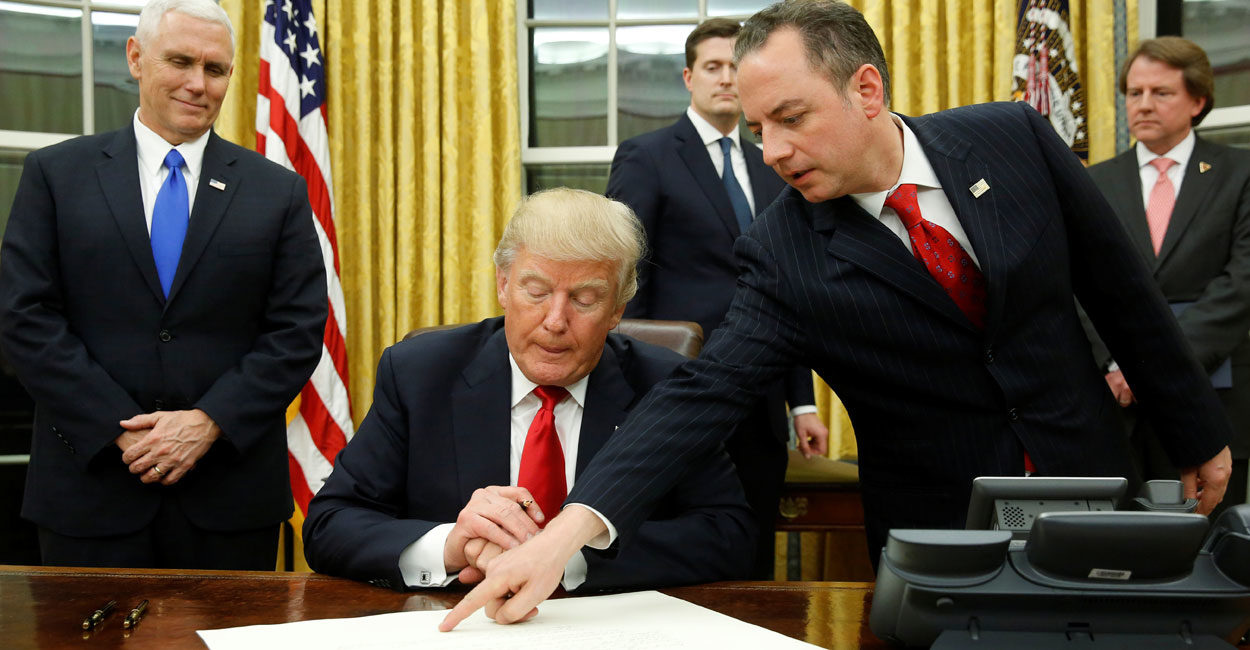
Donald Trump has been successful in fulfilling
many of the promises he campaigned on, but he’s nowhere near finished,
says Newt Gingrich. (Photo: Jonathan Ernst/Reuters/Newscom)
Two weeks into his presidency, Donald Trump has been successful
in fulfilling many of the promises he campaigned on, but he’s nowhere
near finished, former House Speaker Newt Gingrich said.
Speaking Monday at The Heritage Foundation for the final installment in his six-part series on understanding Trump and Trumpism, Gingrich described the president as “the new presidential”—delivering on what he said he would.
Speaking Monday at The Heritage Foundation for the final installment in his six-part series on understanding Trump and Trumpism, Gingrich described the president as “the new presidential”—delivering on what he said he would.
Anti-Business Policies Are the Real Reason Companies Leave
Walter E. Williams

President-elect Donald Trump has threatened U.S.
companies who are looking to relocate in foreign countries with import
tariffs. (Photo: iStock Photos)
President-elect Donald Trump’s threats against American companies
looking to relocate in foreign countries have won favorable review from
many quarters.
Support comes from those alarmed about trade deficits, those who want a “level playing field,” and those who call for “free trade but fair trade,” whatever that means.
Some American companies relocate in foreign lands because costs are lower and hence their profits are higher. Lower labor costs are not the only reason companies move to other countries.
Life Savers, a candy manufacturing company, was based in Holland, Michigan, for decades. In 2002, it moved to Montreal.
Support comes from those alarmed about trade deficits, those who want a “level playing field,” and those who call for “free trade but fair trade,” whatever that means.
Some American companies relocate in foreign lands because costs are lower and hence their profits are higher. Lower labor costs are not the only reason companies move to other countries.
Life Savers, a candy manufacturing company, was based in Holland, Michigan, for decades. In 2002, it moved to Montreal.
Trump’s Executive Order to Repeal Regulations Puts EPA in the Crosshairs
Michael Bastasch
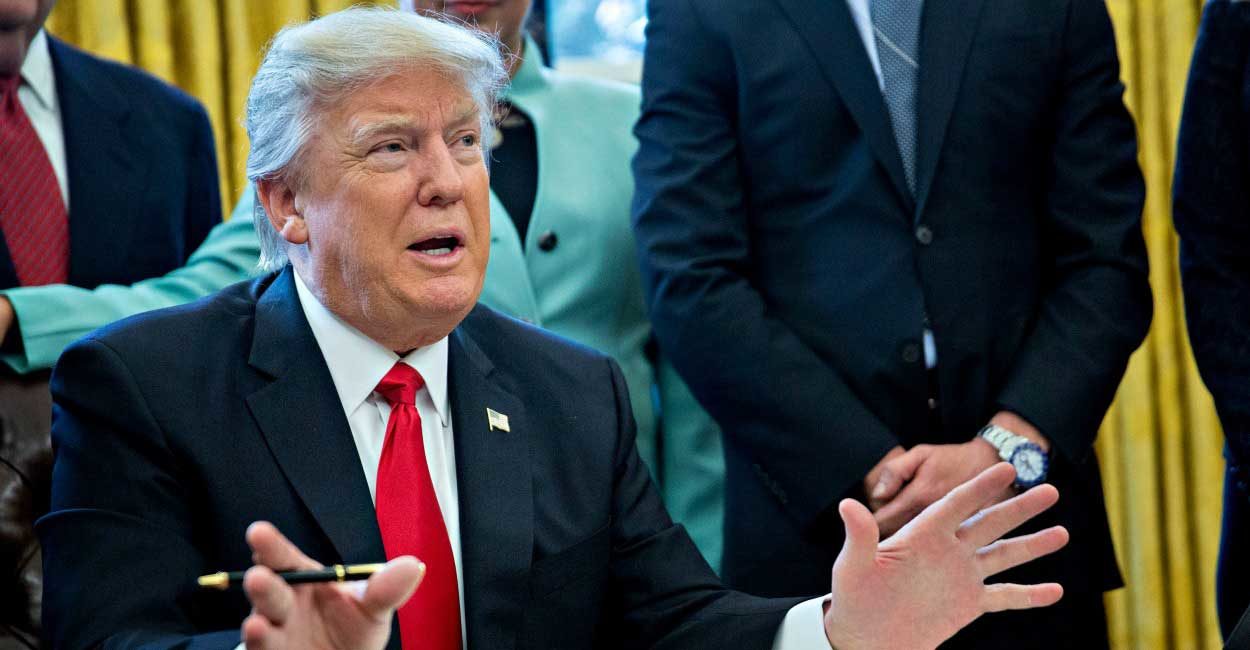
Republicans have long criticized the EPA for
counting “co-benefits” of regulation toward its cost effectiveness.
(Photo: Andrew Harrer/TNS/Newscom)
Trump’s making good on a promise to repeal 75 percent of federal regulations, including rolling back most of the $900 billion in regulations issued by agencies, like the Environmental Protection Agency, during the Obama years.
One provision in Trump’s order could have massive implications for the EPA—whose methodology for crafting regulations has come under fire in recent years—by standardizing the way different agencies measure the costs and benefits of new rules.
Trump ordered the White House’s Office of Management and Budget to issue guidances “standardizing the measurement and estimation of regulatory costs.” On top of that, OMB will control how agencies go about repealing two rules for every new one issued.
OMB will set “standards for determining what qualifies as new and offsetting regulations; standards for determining the costs of existing regulations that are considered for elimination; processes for accounting for costs in different fiscal years; methods to oversee the issuance of rules with costs offset by savings at different times or different agencies; and emergencies and other circumstances that might justify individual waivers of the requirements of this section.”
This is a big win for Republican lawmakers who had concerns Obama’s EPA was fudging the numbers to make regulations look more cost-effective than they would otherwise be.
Republicans have long criticized the EPA for counting “co-benefits” of regulation toward its cost effectiveness.
The cost of the EPA’s mercury rule for power plants, for example, outweigh the benefits by ratio of 1600-to-1 when looking at reductions in mercury emissions—the whole point of the rule.
But the EPA claimed the $10 billion mercury rule would yield between $37 billion to $90 billion in monetized health benefits a year. Virtually all of this comes from the “co-benefits” of reducing other pollutants, like fine particulate matter.
Republicans have argued counting “co-benefits” opens up the possibility of double-counting emissions reductions.
Wyoming Republican Sen. John Barrasso accused the EPA of double-counting the co-benefits of reducing fine particulate matter in its Clean Power Plan rule to limit carbon dioxide emissions from power plants.
Barrasso cited a statement in the EPA’s draft regulatory analyses claiming “it is possible that some costs and benefits estimated in this RIA may account for the same air quality improvements as estimated in the illustrative [National Ambient Air Quality Standards] RIAs.”
The EPA says the Clean Power Plan will cost $8.4 billion per year in 2030 and yield public health and climate benefits of $34 billion to $54 billion per year—$14 billion to $34 billion of which come from reducing air pollutants that have nothing to do with global warming.
EPA officials, however, said they did not double-count any co-benefits.
Utah Republican Rep. Jason Chaffetz asked the EPA why it massively inflated the estimate it uses for calculating its “Value of Statistical Life” (VSL) measure—the monetary value to every estimated life that would be saved by an agency rule.
The EPA has used different VSL estimates for different rules over the past decade without any apparent explanation.
“EPA’s use of VSL appears to have changed dramatically in recent years, at a rate well in excess of inflation and inconsistently with other agencies,” Chaffetz wrote in a 2015 letter to the agency. “Since 2000, other agencies have used a variety VSLs, including $3 million and $5 million.”
“For example, for EPA’s 2015 ozone regulation, EPA assessed at least $4.1 billion in benefits and $2.2 billion in costs using a VSL of $10 million in 2011 dollars for a life saved in 2020,” Chaffetz wrote. “Applying the Department of Transportation’s 2005 VSL proportionally to EPA’s analysis, the estimated benefits decline well under $2 billion, at which point the EPA’s own analysis would indicate the regulation was not worth pursuing.”
Trump Presses UN to Reform. Here’s What Can Be Done to Curtail Its Power.
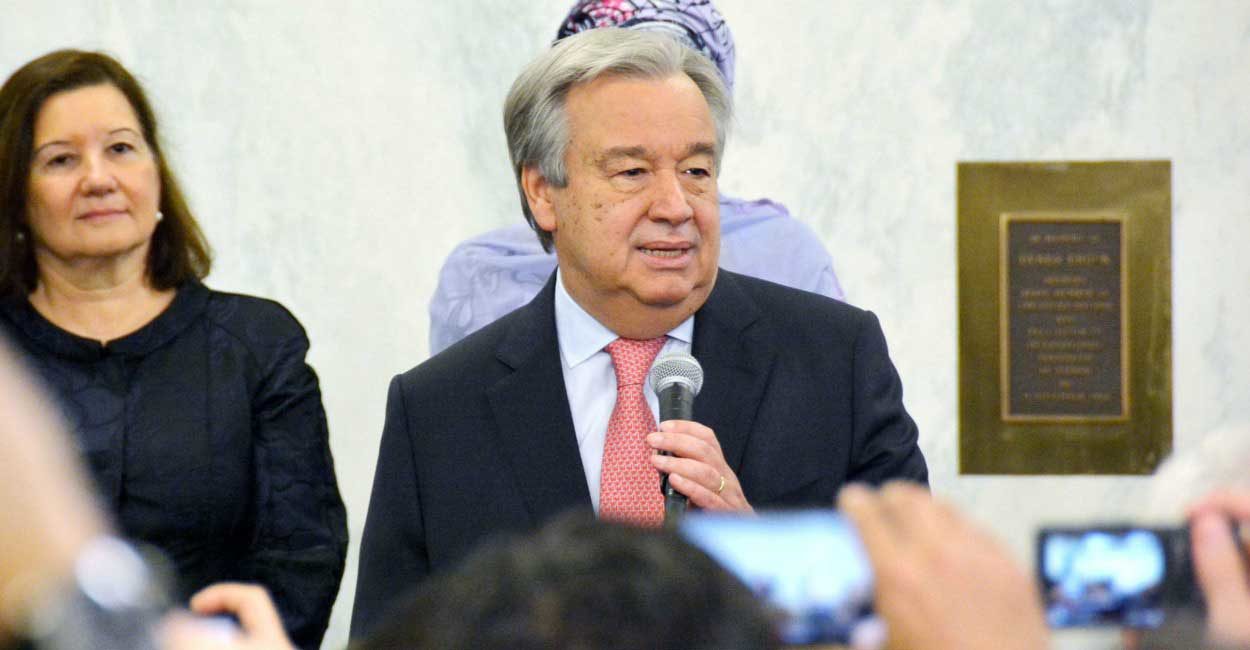
United Nations Secretary-General Antonio Guterres spoke to President-elect Donald Trump on Wednesday. (Photo: Kyodo/Newscom)
President-elect Donald Trump spoke by phone Wednesday with new
United Nations Secretary-General Antonio Guterres—as Trump and some
members of Congress are raising longstanding concerns about the
organization.
“The president-elect has been clear about the U.N.,” presidential transition team spokesman Sean Spicer told The Daily Signal Wednesday during a conference call with reporters. “We will demand reform and change to ensure that taxpayer dollars are spent as efficiently and effectively as possible.”
Spicer said that Trump’s designee for secretary of state, Exxon CEO Rex Tillerson, and pick for U.N. ambassador, Gov. Nikki Haley, R-S.C., would both press the case.
A number of leaders and foreign policy experts also say the U.N. needs serious rethinking and reform.
“The president-elect has been clear about the U.N.,” presidential transition team spokesman Sean Spicer told The Daily Signal Wednesday during a conference call with reporters. “We will demand reform and change to ensure that taxpayer dollars are spent as efficiently and effectively as possible.”
Spicer said that Trump’s designee for secretary of state, Exxon CEO Rex Tillerson, and pick for U.N. ambassador, Gov. Nikki Haley, R-S.C., would both press the case.
A number of leaders and foreign policy experts also say the U.N. needs serious rethinking and reform.
Obama’s Strange Pattern of Concessions to Cuba’s Communists
Mike Gonzalez /
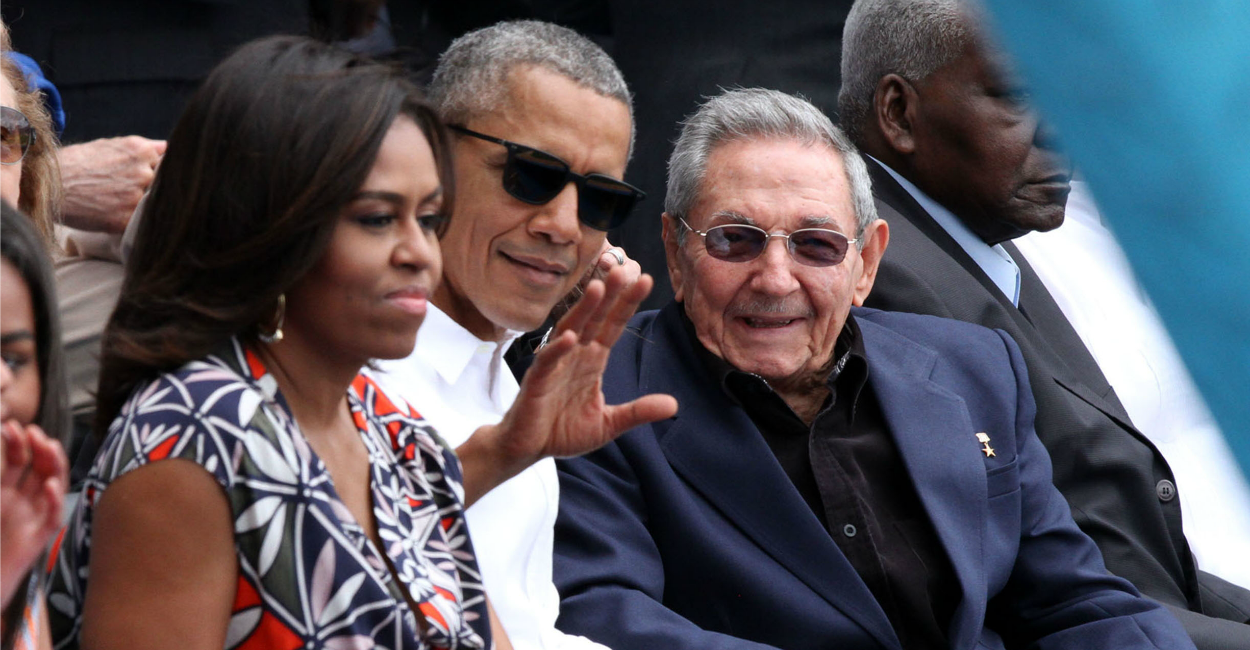
Everything regarding Cuba that President Barack
Obama, shown here with Raul Castro, announced the past two years can be
rescinded come this Friday by Donald Trump. (Photo: Javier Lira/NOTIMEX
/Newscom)
There seems to be something about Cuba’s military dictators that
really fascinates our 44th president. Cuba was the first item President
Barack Obama mentioned when he enumerated his foreign policy
“achievements” in his farewell address; and with just a week to go, he
has rushed anew to make concessions to the communists in Havana.
Are NATO Members Carrying Their Weight? Only 5 of 28 Countries Pay ‘Fair Share’
Josh Siegel /

German soldiers prepare to deploy to Lithuania
for NATO's Enhanced Forward Presence, a forward deployment to protect
members at risk for a Russian attack. (Photo: Matthias
Balk/dpa/picture-alliance/Newscom)
President Donald Trump alarmed European allies during the
campaign when he suggested he might not defend NATO nations if they
don’t fulfill their financial obligations, but he is not the first U.S.
leader to express concerns that member countries don’t spend enough on
their militaries.
Currently, only five of NATO’s 28 members—the U.S., Greece, Britain, Estonia, and Poland—meet the alliance’s target of spending at least 2 percent of their own gross domestic product on defense, a fact that is especially concerning, experts say, because of Russia’s aggressive behavior.
Currently, only five of NATO’s 28 members—the U.S., Greece, Britain, Estonia, and Poland—meet the alliance’s target of spending at least 2 percent of their own gross domestic product on defense, a fact that is especially concerning, experts say, because of Russia’s aggressive behavior.
Our Economy Is Barely Growing. Here’s 4 Steps We Can Take to Change That.
Timothy Doescher
The U.S. economy grew at a lackluster 1.9
percent in the fourth quarter of 2016, wrapping up the year with an
overall growth rate of just 1.6 percent. (Photo: iStock Photos)
Late last week, we were reminded of how much work needs to be
done to clean up the mess President Barack Obama left when the Bureau of
Economic Analysis announced the economy grew at a dismal 1.9 percent in
the fourth quarter—wrapping up 2016 with a growth rate of just 1.6
percent.
This growth is a pittance compared to the historic average of 3.3 percent.
Examining these numbers, and several other factors, it is clear that Obama and the mainstream media’s recent attempt to convince America that we have a thriving economy is farcical at best.
Over the last eight years, federal debt has nearly doubled, falling just short of $20 trillion.
This growth is a pittance compared to the historic average of 3.3 percent.
Examining these numbers, and several other factors, it is clear that Obama and the mainstream media’s recent attempt to convince America that we have a thriving economy is farcical at best.
Over the last eight years, federal debt has nearly doubled, falling just short of $20 trillion.
Trump Should Rescind Obama’s Transgender Agenda and Protect Religious Liberty
Ryan T. Anderson /
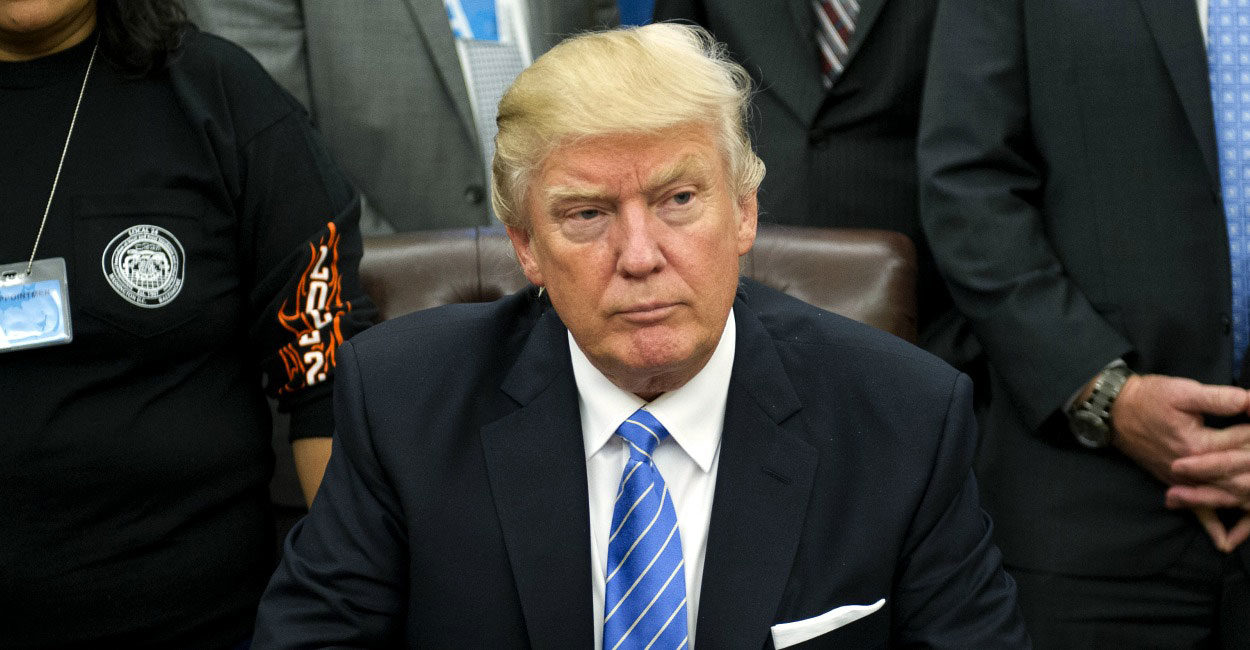
As a candidate, Donald Trump promised to sign
the First Amendment Defense Act into law in order to protect religious
liberty. (Photo: Ron Sachs/UPI
/Newscom
The media was abuzz yesterday with rumors that President Donald
Trump was preparing an executive order that would protect religious
liberty in the aftermath of the redefinition of marriage.
Trump should issue such an executive order, and he should rescind former President Barack Obama’s executive actions on sexual orientation and gender identity that created many of these problems in the first place.
Trump should issue such an executive order, and he should rescind former President Barack Obama’s executive actions on sexual orientation and gender identity that created many of these problems in the first place.
Iran’s Ballistic Missile Test Defies UN, Trump Administration
Michaela Dodge /

A ballistic missile is launched and tested in an undisclosed location, Iran, Mar. 9, 2016. (Photo: Tima/Reuters/Newscom)
The more things change, the more they stay the same.
On Sunday, Iran “welcomed” President Donald Trump into office by conducting a medium-range ballistic missile test in defiance of United Nations Resolution 2231, which endorsed the Joint Comprehensive Plan of Action (i.e. the Iran nuclear deal) and lifted nuclear-related sanctions on Iran.
Iran’s actions are destabilizing to the region and underscore the United States’ need for the development of a comprehensive ballistic missile defense system.
On Sunday, Iran “welcomed” President Donald Trump into office by conducting a medium-range ballistic missile test in defiance of United Nations Resolution 2231, which endorsed the Joint Comprehensive Plan of Action (i.e. the Iran nuclear deal) and lifted nuclear-related sanctions on Iran.
Iran’s actions are destabilizing to the region and underscore the United States’ need for the development of a comprehensive ballistic missile defense system.
Democrats Change Tune After Demanding Up-or-Down Vote on Supreme Court Nominee in 2016
Rachel del Guidice /
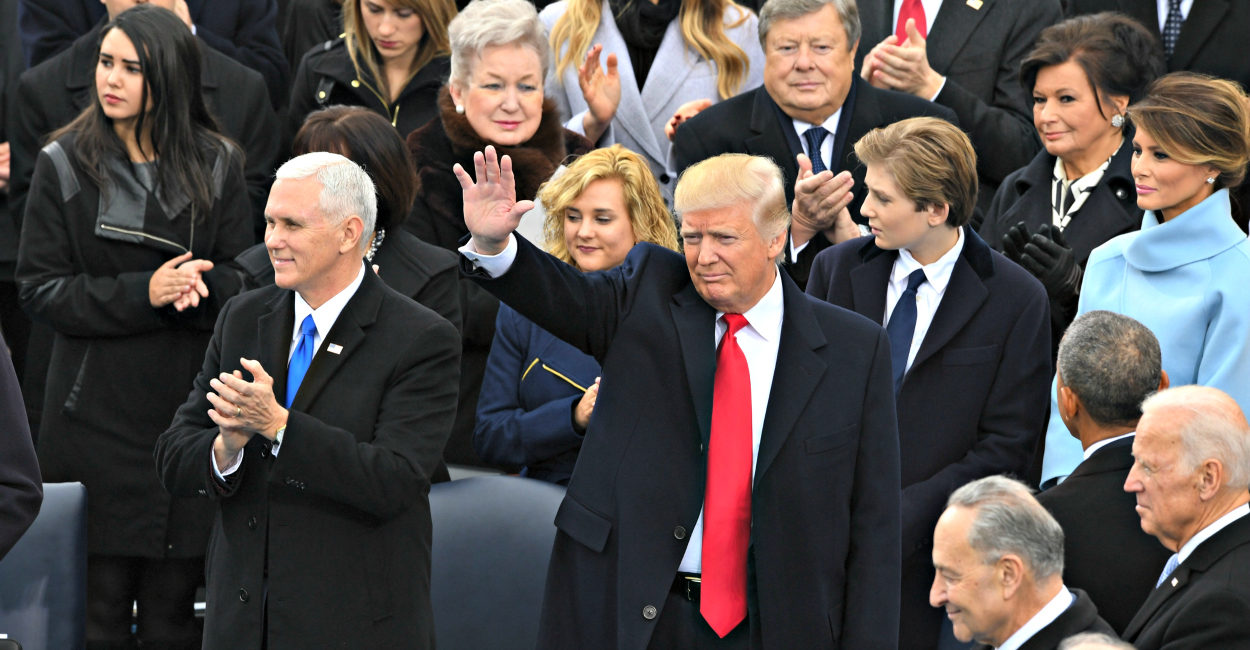
Senate Minority Leader Chuck Schumer, pictured
at bottom right during President Donald Trump's inauguration Jan. 20,
says Democrats will support only a "really good" Supreme Court nominee.
(Photo: Richard Ellis/ZumaPress/Newscom)
Senate Democrats who last year called for an up-or-down vote on
Supreme Court nominees changed their tune as President Donald Trump
prepared to announce his choice for the high court Tuesday night.
“This is a stolen seat,” Sen. Jeff Merkley, D-Ore., said Monday of the vacancy Trump was about to fill. “This is the first time a Senate majority has stolen a seat. We will use every lever in our power to stop this.”
Merkley was referring to President Barack Obama’s thwarted nomination of a U.S. appeals court judge, Merrick Garland, to fill the Supreme Court seat of Justice Antonin Scalia, who died in February.
“This is a stolen seat,” Sen. Jeff Merkley, D-Ore., said Monday of the vacancy Trump was about to fill. “This is the first time a Senate majority has stolen a seat. We will use every lever in our power to stop this.”
Merkley was referring to President Barack Obama’s thwarted nomination of a U.S. appeals court judge, Merrick Garland, to fill the Supreme Court seat of Justice Antonin Scalia, who died in February.
What Could Go Wrong in America?
Martin Feldstein
Martin Feldstein, Professor of
Economics at Harvard University and President Emeritus of the National
Bureau of Economic Research, chaired President Ronald Reagan’s Council
of Economic Advisers from 1982 to 1984. In 2006, he was appointed to
President Bush's Foreign Intelligence Advisory Board, and,… read more


CAMBRIDGE
– Although the United States economy is in good shape – with
essentially full employment and an inflation rate close to 2% – a world
of uncertainty makes it worthwhile to consider what could go wrong in
the year ahead. After all, if the US economy runs into serious trouble,
there will be adverse consequences for Europe, Japan, and many other
countries.
Economic
problems could of course originate from international political events.
Russia has been acting dangerously in Eastern and Central Europe.
China’s pursuit of territorial claims in the East and South China Seas,
and its policies in East Asia more generally, is fueling regional
uncertainty. Events in Italy could precipitate a crisis in the eurozone.
The Shape of US Tax Reform
Martin Feldstein
Martin Feldstein, Professor of
Economics at Harvard University and President Emeritus of the National
Bureau of Economic Research, chaired President Ronald Reagan’s Council
of Economic Advisers from 1982 to 1984. In 2006, he was appointed to
President Bush's Foreign Intelligence Advisory Board, and,… read more


CAMBRIDGE
– Major tax reform is high on the agenda for the United States in 2017.
The Republican-controlled House of Representatives has been preparing
for this for years, creating detailed plans for overhauling how
corporate and personal income are taxed. Now, with a Republican majority
in the Senate and a Republican president in the White House, those
plans can provide the basis for legislative action.
The proposed
corporate tax reform is especially significant. I believe it will have a
highly favorable impact on business investment, raising productivity
and overall economic growth. The new tax rules will also have
significant effects on foreign economies.
Trust in Markets and Antitrust in Media
Sergei Guriev
Sergei Guriev is Chief Economist at the European Bank for Reconstruction and Development.


LONDON
– This year’s World Economic Forum Annual Meeting in Davos came at a
moment of puzzlement for the world’s economic and financial elites.
Although the global economy has lately been doing rather well, voters
have been rebelling against them.
Despite
much-publicized challenges and weak points, there has been plenty of
good economic news in recent years. Globalization and technological
progress have supported annual global per capita GDP growth of
2.5% since 2009 – lower than before the Great Recession, but still very
high by historical standards. In the last 35 years, the share of the
world’s population living in poverty has fallen from 40% to just 10%.
Playing with Economic Matches
Ashoka Mody
Ashoka Mody is Visiting Professor of
International Economic Policy at the Woodrow Wilson School of Public and
International Affairs at Princeton University. He is a former mission
chief for Germany and Ireland at the International Monetary Fund.


PRINCETON – At this time last year, the International Monetary Fund reported
disappointing global GDP growth of 3.1% in 2015, and promised that
growth would increase in 2016 and 2017. But that expectation was
unrealistic, as I explained
at the time. And, sure enough, in 2016, it is estimated that global GDP
again grew by only 3.1%, while world trade growth slowed substantially,
from 2.7% to an anemic 1.9%. These figures describe a troubled world
economy.
And yet the IMF is again forecasting
that global GDP growth will significantly improve over the next two
years, and that world trade growth will double. The IMF attributes much
of the expected improvement in the global economy, especially in 2017,
to stronger GDP growth in the United States. This optimism about the US
economy is based on positive business- and consumer-confidence
indicators and rising stock prices, in anticipation of fiscal stimulus
and deregulation.
“Alternative Facts” and US Economic Policy
Simon Johnson
Simon Johnson, a former chief
economist of the IMF, is a professor at MIT Sloan, a senior fellow at
the Peterson Institute for International Economics, and co-founder of a
leading economics blog, The Baseline Scenario. He is the co-author, with James Kwak, of White House Burning: The Founding Fathers… read more

WASHINGTON,
DC – US President Donald Trump has an obvious problem with data that he
doesn’t like, as he showed on his first full day in office, by
attacking the media for reporting accurately the size of the crowd that
attended his inauguration. It should be no less obvious that this same
reliance on “alternative facts” poses a severe threat in the realm of
economic policymaking.
The number of people who attended the inauguration – far less than Trump wanted to believe – could easily be inferred from the available evidence
(including photographs of the National Mall and the number of subway
riders). But the discussion has now broadened to the more serious
question of whether millions of people voted illegally, as Trump has
insisted since the election. He has implicitly conceded that he lost the popular vote by nearly three million votes, but maintained, despite all evidence to the contrary, that massive voter fraud occurred.
Celebrating Human Action—Ludwig von Mises’s Masterpiece
Celebrating Human Action—Ludwig von Mises’s Masterpiece
By Robert Murphy

September 14 marked the 65th anniversary of the publication of Ludwig von Mises’s masterpiece Human Action.
I have been studying Mises’s classic text very carefully the past two
years, as I’ve completed the manuscript for a forthcoming Independent
Institute book, Cooperation and Enterprise: The Economics of Choice, that crystallizes the essence of Human Action for an undergraduate reader. Fresh off of this journey, I wanted to summarize two of the main themes in Human Action.
Let’s begin with the title itself, which I remember struck me as an odd choice for a book on economics. Yet Mises explains in the opening of his treatise that the narrow subject matter of technical economics is not a self-contained discipline. Instead, Mises argued that the subjectivist revolution ushered in by Carl Menger (as well as Léon Walras and William Stanley Jevons) required placing the study of market phenomena within the broader context of a study of purposeful human behavior, or what Mises simply called action. Here is how Mises explains this development in the social sciences:
Let’s begin with the title itself, which I remember struck me as an odd choice for a book on economics. Yet Mises explains in the opening of his treatise that the narrow subject matter of technical economics is not a self-contained discipline. Instead, Mises argued that the subjectivist revolution ushered in by Carl Menger (as well as Léon Walras and William Stanley Jevons) required placing the study of market phenomena within the broader context of a study of purposeful human behavior, or what Mises simply called action. Here is how Mises explains this development in the social sciences:
We Need Free Enterprise in Banking
We Need Free Enterprise in Banking
By Robert Murphy

Former House Speaker Dennis Hastert has pleaded guilty in what has been called a “hush-money” case.
Hastert could receive up to five years in prison, though prosecutors
have recommended six months as part of his plea deal. The amazing thing
about this case is that such a harsh sentence comes not from any
misconduct in the distant past. As the NPR story explains: “The
former Republican speaker was charged with one count of evading bank
rules about currency transactions and one count of lying to federal
investigators. Under the plea agreement Hastert pleaded guilty only to
the charge involving currency violations.” When an individual can
get six months in prison–to avoid five years–for the crime of
withdrawing his own money out of the bank, you know we have left the
realm of economic freedom.
Who’s the Bigger Witch Doctor? Gerald Friedman or Paul Krugman?
Who’s the Bigger Witch Doctor? Gerald Friedman or Paul Krugman?
By Robert Murphy

Conflict has erupted among left-progressive economists over a study touting the alleged benefits of Bernie Sanders’s proposals. Specifically, the Sanders campaign was happily citing UMass at Amherst economist Gerald Friedman’s 53-page analysis (released on January 28) that projected the eccentric candidate would deliver amazing economic performance–especially for the middle class and poor–over the first ten years.
On February 17, former Council of Economic Advisor chairs for Democratic presidents (Laura D’Andrea Tyson, Christina Romer, Austan Goolsbee, and Alan Krueger) published an open letter to Prof. Friedman and the Sanders campaign, scolding them for their unsupportable promises. Here is a flavor of their upbraiding:
We are concerned to see the Sanders campaign citing extreme claims by Gerald Friedman about the effect of Senator Sanders’s economic plan—claims that cannot be supported by the economic evidence. Friedman asserts that your plan will have huge beneficial impacts on growth rates, income and employment that exceed even the most grandiose predictions by Republicans about the impact of their tax cut proposals.
As much as we wish it were so, no credible economic research supports economic impacts of these magnitudes. Making such promises runs against our party’s best traditions of evidence-based policy making and undermines our reputation as the party of responsible arithmetic. These claims undermine the credibility of the progressive economic agenda and make it that much more difficult to challenge the unrealistic claims made by Republican candidates.
Mises, Military, and Market
Mises, Military, and Market
By Robert Murphy
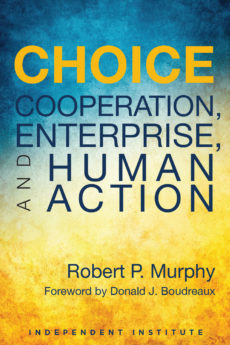
September 29 is the birthday of Ludwig von Mises, one of the giants of the Austrian School of economics. In my book Choice: Cooperation, Enterprise, and Human Action, I distill the work of Mises as presented in his masterpiece, Human Action. Elsewhere I have summarized his contributions to economic science, so in the present post I will focus on a single topic where Mises fundamentally changed my own worldview: the military and the market.
Before I encountered Mises’s analysis, I was a young conservative/libertarian with a strong affinity for the free market. However, although I knew that (say) minimum wage laws wouldn’t really help unskilled workers, and that rent control laws weren’t effective ways to provide affordable housing, nonetheless I made a big exception for genuine emergencies like a world war. In particular, I was not confident in trusting “market forces” with resource allocation for a major undertaking such as fighting the Nazis. In this situation (so I thought), of course you would need a powerful federal government to override price signals and make sure enough steel, rubber, gasoline, etc. went into the war effort.
Trump’s Wall—an Attempt to Insult and Humiliate Mexicans
Trump’s Wall—an Attempt to Insult and Humiliate Mexicans
By Robert Higgs
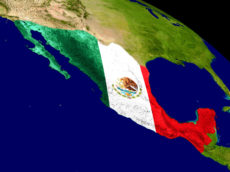
Suppose the Canadians were to build a wall to keep Americans out of their country, making it clear that Americans are simply not decent, productive, peaceful people and therefore the fewer of them who enter Canada the better. Might Americans take justifiable offense at such treatment?
Why does anyone imagine that Mexicans feel any differently?
I spent more than a decade of my career largely engaged in studying the history and economics of U.S. racial differences and race relations. (See, for example, my book Competition and Coercion.)
No comments:
Post a Comment